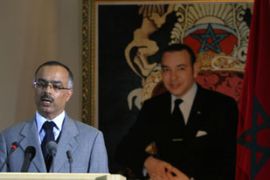Conservative party in Morocco win
Istiqlal, a member of the outgoing government, dashes Islamic party’s ambitions.

The Constitutional Union party occupied the sixth position with 27 seats.
A total of 34 women have also been elected.
|
“There are no chances of Islamic groups winning as most people in Morocco are enjoying its liberal culture” Nazia, Lahore, Pakistan |
“Dirty money has been flowing into the voting system. We have the proof and we will challenge this,” Lahcen Daoudi, PJD deputy leader, told supporters in Rabat.
Hashem Ahelbarra, Al Jazeera’s correspondent in Rabat, the kingdom’s capital city, said Istiqlal – the election’s big winner – was traditionally strong in rural areas but never very popular in the cities.
However, if it were invited to form the next coalition government, Istiqlal might need partners from among the very parties at whose expense it has made gains.
